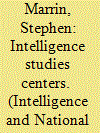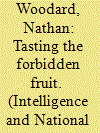| Srl | Item |
| 1 |
ID:
116161


|
|
|
|
|
| Publication |
2012.
|
| Summary/Abstract |
Improving intelligence analysis requires bridging the gap between scholarship and practice. Intelligence studies as an academic discipline is not very theoretical compared to the more established disciplines of political science and international relations. In terms of conceptual depth, levels of abstraction and theoretical development, even the theoretical portions of the academic intelligence studies literature could be described as policy relevant and potentially useful for practitioners, including intelligence analysts. Yet despite this orientation to the practitioner, there is still a substantial gap between scholars and practitioners, thus replicating within a more applied context the conventional theory/practice divide that exists in other fields. Those fields do, however, possess a variety of ideas and recommendations that could be used to bring scholarship on intelligence analysis closer to practice. If implemented, these ideas might help actualize the benefits of scholarship that are as yet still unrealized potential.
|
|
|
|
|
|
|
|
|
|
|
|
|
|
|
|
| 2 |
ID:
118366


|
|
|
|
|
| Publication |
2013.
|
| Summary/Abstract |
The relationship between intelligence analysis and policy decisions is a contentious one with both policymakers and intelligence analysts frequently expressing frustration over its underlying dynamics and with each faulting the behavior of the other. This article examines one aspect of this relationship, the manner in which intelligence analysis can become politicized. Rather than view politicization as an aberration it is treated here as a normal feature of intelligence analysis. A typology of politicization organized around the concepts of hard and soft politicization is presented and illustrated with historical examples from the American experience with intelligence analysis.
|
|
|
|
|
|
|
|
|
|
|
|
|
|
|
|
| 3 |
ID:
118370


|
|
|
|
|
| Publication |
2013.
|
| Summary/Abstract |
Purposeful politicization is generally viewed as a cardinal sin by intelligence analysts because it degrades objectivity and credibility, and inadvertent influence is sometimes tolerated as a necessary evil in order to make intelligence useful. Some forms of politicization are clearly unethical, but politicization is not inherently evil. In fact it is an ethically neutral form of rhetorical discourse which when properly controlled can provide policymakers with additional decision advantage. When viewed through a rhetorical lens, evidence-based purposeful politicization is more objective than inadvertent influence because it does not try to hide where the evidence leads. By decoupling objectivity and neutrality, it becomes clear that taking a stand on the evidence or making a tough recommendation based on professional judgment are not practices that need to be avoided. As intelligence practitioners seek to remain relevant in the 21st century, embracing ethically-controlled, evidence-based, policy prescriptive analysis can give them the tools they need to succeed.
|
|
|
|
|
|
|
|
|
|
|
|
|
|
|
|
| 4 |
ID:
102369


|
|
|
|
|
| Publication |
2011.
|
| Summary/Abstract |
As the January 1968 Tet holiday approached, CIA analysts and American commanders in South Vietnam developed more accurate conclusions about communist military strategy than did intelligence analysts at CIA headquarters. Besides valuing different types of intelligence, General William Westmoreland, Lieutenant General Frederick Weyand, and CIA analysts in Saigon also placed greater emphasis on new information about communist military strategy than did CIA analysts at Langley. These different reactions to information highlight reasons why military commanders and intelligence analysts stationed in the theater of operations might develop more accurate conclusions about enemy military strategy than intelligence analysts stationed at their national headquarters.
|
|
|
|
|
|
|
|
|
|
|
|
|
|
|
|